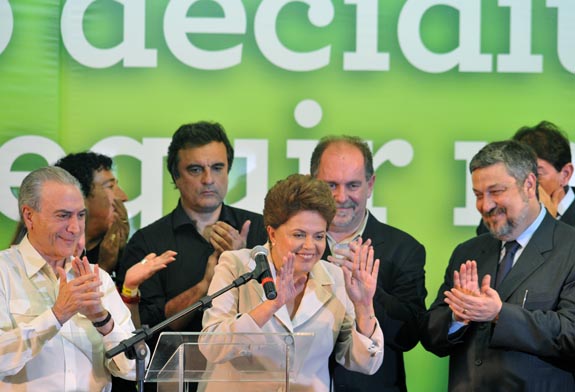
Dilma Rousseff became the first woman president of Brazil. (Photo by Agência Brasil.)
By Ralph De La Cruz
Florida Center for Investigative Reporting
While America was sleeping off its excesses, the world changed.
On Jan. 1, Dilma Rousseff became Brazil’s president.
Chew on that for a second. A nest of South American machismo, the very birthplace of the thong bikini and the jiggle that goes with it, has a woman president.
Actually, put aside the stereotypes and cheeks/nalgas stuff for the moment. Because this is too big to trivialize with pop-culture garbage:
One of the world’s emerging economic superpowers has a woman president.
And she’s a former Marxist guerrilla, to boot. An imprisoned and tortured former Marxist.
Which was once the United States’ worst nightmare. That fear prompted us to become notorious, often-bumbling nation-wreckers and nation-builders in South America for half a century.
But lately we’ve been so preoccupied with Afghanistan, Iraq and North Korea that we let South America transform by itself.
And indeed, it transformed in ways that American leaders had been fearing for decades. South America went if not communist at least decidedly left-leaning.
Join the ConversationWhat does South America’s political left turn mean for the United States and Florida? Tell us in the comments below. |
Ecuador. Paraguay. Venezuela. Argentina. Bolivia. Uruguay. And Brazil.
But surprise! The world didn’t end (although there’s still the matter of Venezuela’s President-for-Life in the making, Hugo Chavez).
It veered sharp left, swung back toward the center and stabilized. Perhaps even moving slightly back to the right.
“The outcomes reflected less the embrace of leftism than a desire for a new kind of politics,” Michael Shifter, vice president of the policy research group Inter-American Dialogue told The New York Times.
And with the exception of Chavez, a case could be made that the center-left shift has had a beneficial effect on the region.
Outgoing Brazilian president Luiz Inácio Lula da Silva left office with an 89 percent approval rating. Before she turned power over to right-leaning Sebastián Piñera, Chile’s center-left Michelle Bachelet had approval ratings in the mid 70s.
And now we have Rousseff, the former militant, indicating through her early appointments that she appears to be trying to patch up the relationship between the Yanquis and the Lefties.
Happy New Year, indeed.
